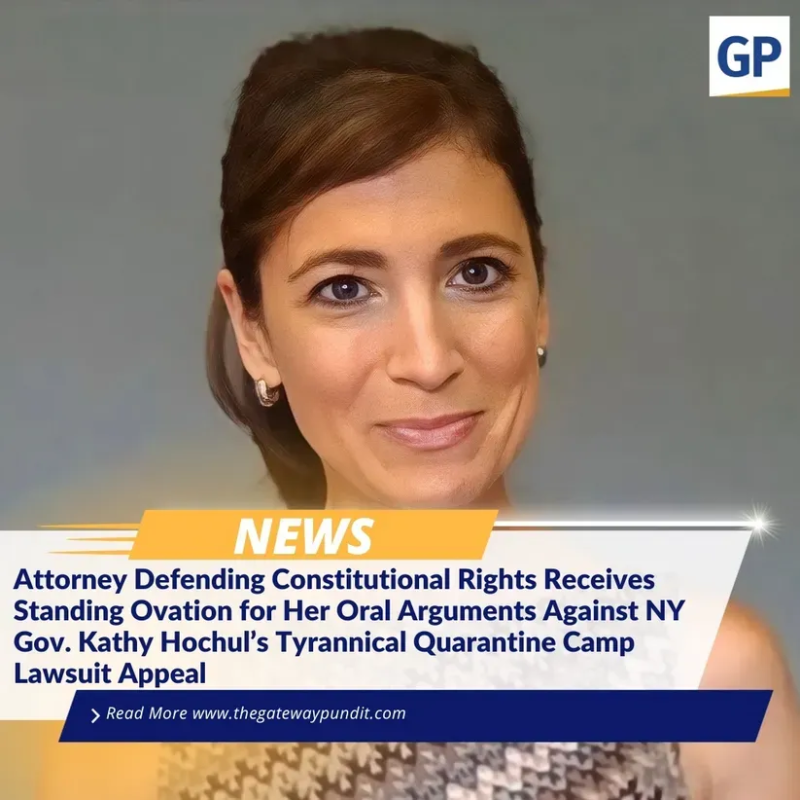
In the past two weeks since the NYS Supreme Court Appellate Division shockingly reversed our quarantine lawsuit victory over Governor Hochul and erroneously ruled that my plaintiffs didn’t have standing to bring the case, there has been a flurry of confusion and a tidal wave of questions. I wrote an article last week to try to answer some of the most common questions about the lawsuit, the status of the quarantine reg, our next steps, etc. You can read that article here.
However, it’s clear to me that further explanation is needed still, and that in particular, I have to fact-check the self-proclaimed “fact-checkers.” It’s astonishing I have to take the time to do this, but I’m quite happy to do so, because it irks me to allow misinformation to float around out there. Funny, I thought the totalitarians hated “misinformation,” and that’s why they censor (or get the mainstream media and social media companies to censor) truth. But I guess that’s only the “misinformation” that goes against their agenda. Ok, so here it goes…
I do a lot of public speaking, and I oftentimes hear from people at these events that they try to tell others about this quarantine lawsuit battle, but people either don’t believe them that it’s true, or they accuse the person of exaggerating because “Kathy Hochul doesn’t actually want to put people into quarantine ‘camps.’” I think that this likely has a direct correlation with the Associated Press’ (“AP”) self-proclaimed “fact-check” article that they put out a few days after my oral arguments against the Attorney General at the Appellate Division courthouse.
If you hadn’t heard, about 400 people showed up that day to hear me argue the case in front of the 5-judge panel, and at the end, the crowd erupted into a tremendous standing ovation that followed me from inside the courtroom, through the courthouse, and out onto the courthouse steps! It was like something out of a movie. Truly, that never happens in real life.
My arguments were live-streamed and recorded not just on the court’s website, but by media outlets like Epoch Times, NTD News, and CHD TV. You can watch the arguments here, you can watch the standing ovation in the courthouse atrium captured by Shannon Joy of Shannon Joy Radio here, and you can read about my autobiographical account of the day here.

Back to the AP’s full-of-bull article…
So as a result of the big splash that my oral arguments made, there were news reports, like this one by Gateway Pundit (“Attorney Defending Constitutional Rights Receives Standing Ovation for Her Oral Arguments Against NY Gov. Kathy Hochul’s Tyrannical Quarantine Camp Lawsuit Appeal”), and there was a firestorm on social media about the case. People were talking all about Hochul and her thirst to overturn my lawsuit victory from 2022, so she could have the power to put New Yorkers into quarantine “camps” at will.
This prodded the AP to write a “fact-check” article about my case. The author of the article reached out to me, and to each of my legislator-plaintiffs, for information. We provided a joint statement to her, which she completely ignored, and then went on to write an article that assumes you are so ignorant, you don’t realize their double-play on words, nor do you see the wool they’re pulling over your eyes.
Here is the link to their article, and here it is reproduced below:
New York Gov. Kathy Hochul is not trying to create ‘quarantine camps’
By Melissa Goldin
Published 7:45 PM EST, September 19, 2023
CLAIM: New York Gov. Kathy Hochul is trying to create “quarantine camps” in which people can be held against their will if they have Covid-19 or other diseases.
AP’S ASSESSMENT: False. Officials have repeatedly said that the state has no intention to build quarantine camps. Critics are misrepresenting a temporary rule adopted during the Covid-19 pandemic that outlines powers by state health officials to isolate or quarantine people for the purpose of controlling a highly transmissible disease. The rule said that people can be isolated or quarantined in interim housing, rather than just their own homes, but doesn’t mention camps. It was deemed unconstitutional by a judge, who said the state overreached, but also did not mention camps.
THE FACTS: The state has appealed the judge’s decision, and oral arguments took place last week. In the days since, some on social media resurrected the false claim that the rule is part of a plan by Hochul to create “quarantine camps” in New York.
“She wants quarantine camps for diseases that could be Covid, could not be Covid, things that aren’t even contagious,” a woman in a popular TikTok video said of Hochul. “Things like Lyme disease, ok? Things like toxic shock syndrome. You know, the thing you get if you put a tampon in wrong, ok? She wants you to go to the quarantine camp for that.”
The video was viewed more than 350,000 times, though was no longer on the platform as of Tuesday. An Instagram post that shared the same clip had received more than 2,000 likes.
But neither Hochul nor other New York officials have proposed creating “quarantine camps.”
Cort Ruddy, a spokesperson for the New York State Department of Health, told The Associated Press that he cannot comment on pending litigation. But agency officials have previously told other media outlets they do not intend to create such camps.
Instead, this claim distorts a temporary regulation that the state has moved to make permanent.
The rule, Section 2.13, outlined isolation and quarantine procedures to control highly transmissible diseases. It was first adopted as part of New York’s Codes, Rules, and Regulations on March 9, 2020, in response to the Covid-19 pandemic.
The rule said the state commissioner of health may issue isolation or quarantine orders, or may direct the local health authority to do so. Among its guidelines, it stated that in addition to an individual’s home, isolation or quarantine may take place in temporary housing, as deemed appropriate by public health authorities.
But nothing in the rule mentions “camps” nor suggests the state has plans to erect them, Lawrence Gostin, a professor of global health law at Georgetown University, confirmed.
“New York State, the federal government, or for that matter anywhere in America that I’m aware of, has no immediate plan, or plan at all, to reissue any kind of isolation or quarantine,” he said. Gostin noted that such measures were rare — even during the height of the Covid pandemic, when New York’s rule was in effect — and recommendations for people to stay at home were far more common.
Rather, “temporary housing” could refer to situations like someone who lives in a congregate setting with vulnerable individuals, and who therefore might be better off isolating in a room in a hotel, Gostin said.
Section 2.13 was extended by successive 90-day periods after its adoption three years ago, and the state moved to make it permanent in December 2021.
The state has argued that the rule merely clarifies powers to compel people to isolate or quarantine that it already had — a position Gostin concurs with. However in March 2022, three Republican state lawmakers filed a lawsuit arguing that it encroached on the legislature’s lawmaking powers and that requiring people to isolate or quarantine against their will violates their right to due process.
The suit does not allege the creation of “quarantine camps.” State Sen. George Borrello, the lead plaintiff on the case, told the AP in a statement that its intent was to invalidate Section 2.13, “which was a clear breach of separation-of-powers.”
“Given the language, it is clear that the Commissioner of Health or a local health department could quarantine individuals against their will at a location of the Commissioner or Health Department’s choosing – a gross abuse of due process and New Yorkers’ civil rights,” Borrello said.
In July 2022, State Supreme Court Justice Ronald Ploetz voided the rule, saying that it violates state law and “ignores the balancing act between an individual’s rights and the need for public safety.”
New York Attorney General Letitia James filed an appeal to Ploetz’s decision on behalf of the Hochul administration. The appeal is still underway.
___
This is part of AP’s effort to address widely shared misinformation, including work with outside companies and organizations to add factual context to misleading content that is circulating online.
There are so many misstatements in that article, it would take me quite a while to explain them all to you. So I’ll just say, that I think this supposed “fact-check” article is best summed up in a recent Epoch TV show, Facts Matter, where Roman Balmakov points out, in essence, don’t worry, the government is not trying to put you into quarantine camps, because their Rule 2.13 says “temporary housing” and not “camps” so…. And if you think that there is no difference between “camps” and “temporary housing” that you are forced to stay in until the government says you can leave, well, that’s on you!
I’m laughing now, even as I write, because it’s so ridiculous that they don’t think you see through their double talk. You can watch Roman’s report here. I strongly suggest you do. In addition to making me laugh out loud about the AP article’s absurdity, Roman also does a nice job explaining the history of my lawsuit, the reg, etc.
In the end, I fact-check this AP “fact-check” article as – FALSE!
My next point of clarification is:
Rule 2.13 “Isolation and Quarantine Procedures” does not exist at this moment. My lawsuit victory in 2022 successfully struck down that horrendous, totalitarian regulation, and the Judge forbade the Governor and her DOH from reissuing the regulation. Because it was an emergency regulation, and we prevented it from becoming a permanent regulation, in order for Rule 2.13 to become valid again, the Governor and her DOH would have to go through the administrative process of reissuing it. Thanks to the Appellate Division ruling two weeks ago, the Governor and her DOH could start that reissuance process at any moment!
Republished from the author’s Substack
Disclaimer
Some of the posts we share are controversial and we do not necessarily agree with them in the whole extend. Sometimes we agree with the content or part of it but we do not agree with the narration or language. Nevertheless we find them somehow interesting, valuable and/or informative or we share them, because we strongly believe in freedom of speech, free press and journalism. We strongly encourage you to have a critical approach to all the content, do your own research and analysis to build your own opinion.
We would be glad to have your feedback.
Source: Brownstone Institute Read the original article here: https://brownstone.org/

